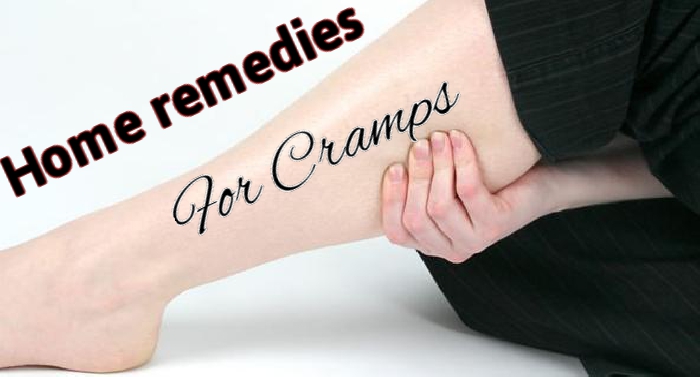Muscle cramps are strong, painful contractions or inflammation of muscles that suddenly occurs and lasts for a few seconds to several minutes. It often occurs on your legs, especially on your calf muscles. A leg cramp often tends to awake you from sleep in the middle of the night or occur when you are doing some heavy physical activity.

What causes muscle cramps?
Leg cramps are caused due to many conditions ranging from dehydration to something more serious like a kidney disease. Some major reasons are;
- Abnormal nerve activity during your sleep
- Excessive strain on calf muscles due to heavy exercise or sudden muscle contraction.
- Loss of blood to the muscle areas due to various sleeping positions.
- Also pregnant women are more prone to leg cramps due to the strain on their leg muscles caused by the extra weight of the child.
- Neurological conditions like Motor neuron disease or peripheral neuropathy can also lead to various types of muscle contractions.
Home remedies for muscle cramps
Mustard – A cure for cramps
Cramps are usually caused due to the deficiency of a compound called acetylcholine, which is a neurotransmitter that stimulates the muscles to function properly. Mustard is rich in acetic acid, which induces the body to produce more acetylcholine. Athletes during their strenuous exercise usually use gels and drinks made of mustards to avoid cramps. Mustard can be used in the following ways;
- Mustard infused bath: Combine 2 tablespoons of mustard and Epsom salt in your warm water bath. Soak in the bath for about 20 minutes. This will significantly relax the muscles in your body. The magnesium present in the mustard will help in soothing the inflammation of muscles.
- Mustard oil: If you are getting frequent night cramps, apply a few drops of mustard oil on your calves and legs before going to bed. This will help you to get a sound sleep, without any night cramps waking you.
- Edible mustard: Eat 1 teaspoon of yellow mustard and walk around for a while. This will help you in healing the muscle spasms and improves blood circulation.
Bananas keep from cramping
Bananas are a rich source of potassium. Also they are easy and luckily tasty to intake. Muscle twitches or cramps also occur as a sign of potassium deficiency. In such cases bananas could help you greatly. However, if the underlying cause for your muscle spasm is more serious like in the case of any neurological disorders, then it is better to go for a doctor’s advice. Bananas help in;
- Balancing the electrolytes in your body and thus avoiding cramps due to unbalanced electrolytes.
- Instant source of energy, as they get easily absorbed by the body.
- Helps in hydrating the muscle cells and helps them stay healthy.
Apple cider Vinegar to soothe muscle cramp
Apple cider vinegar is also a potassium supplement. It helps in quick relief from cramps, if it is due to the potassium deficiency. It can be used in the following ways;
- A vinegar wrap: Athletes and people with severe muscle cramp issues can soak a dry cloth in strong vinegar solution and wrap it around the cramped muscle. This will help in soothing the muscle and thereby eases the cramp.
- Vinegar drink: Add 2 teaspoons of vinegar to a large glass of water and drink the content before going for some rough physical exercise.
Reflexology and Acupuncture therapy to ease cramps
Reflexology, also called as massage will help in easing the cramp once it has started. Simply stretch out the cramped leg and start massaging the calves or the cramped portion of muscles slowly. Massage with long upward strokes, starting from your heel to the back of your knee. You can also make use of mustard oil for a massage.
Sit and bend the knee of your cramped leg, bringing your leg up toward the chest. There is an acupressure point in your calf muscle on the back of your leg. It is located about halfway between the back of your knee and your heel, right at the bottom of your calf muscle bulge. Press and hold the point for 1 minute or until you feel the cramp easing out.
Simple stretching exercises for cramp relief
There are 3 simple stretching exercises that will help you to get relief from leg cramps.
- Rigid calf stretch: Stand facing a wall and extend your arms at chest height and place them on the wall. Place your right leg forward by flexing the knee. At the same time keep the left leg straight behind. Slowly move towards the wall like you are pushing it. Repeat the same using the other leg.
- Simple standing stretch: Stand closer to a chair and place your right heel on it. See to it that your foot on the chair is rigid and straight. Slowly bend forward at the hips, keeping your upper body erect and your left foot fixed firmly to the ground. Repeat on the other side.
- Seated calf stretch: Sit on the floor and extend both the legs. Keep your back erect and bend at your hips to stretch forward and hold your toes or calves. Hold for a few seconds and relax. Repeat the same for about 20 times.
-
Eat good to beat leg cramps
One of the main reasons for the occurrence of leg cramps is the deficiency of minerals like calcium, magnesium, potassium and Sodium. Some foods recommended for fighting against mineral deficiency are;
- Potassium rich foods:
Potassium is very important for proper muscular functioning. Whole foods like fruits, vegetables, milk and fish contain a large amount of potassium. Bananas, melons, avocados and citrus fruits are instant sources of potassium that can be consumed in its raw form.
- Calcium rich foods:
Calcium plays a major role in muscle contraction. It also helps in impulse generation of nerves. Dairy products are the rich sources of calcium. Also leafy green vegetables, spinaches, almonds, figs, etc also contain a good amount of calcium.
- Magnesium rich foods:
Magnesium stabilizes the energy required for muscular contraction. Magnesium levels in our body can be increased by eating beans and legumes, nuts, seeds, whole grains like wheat, oats, etc and leafy greens.



